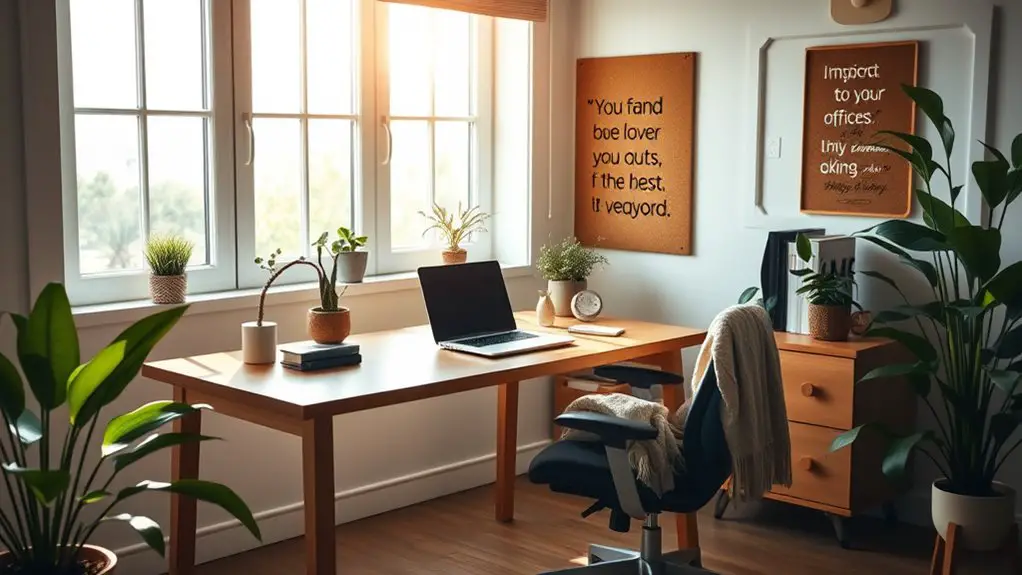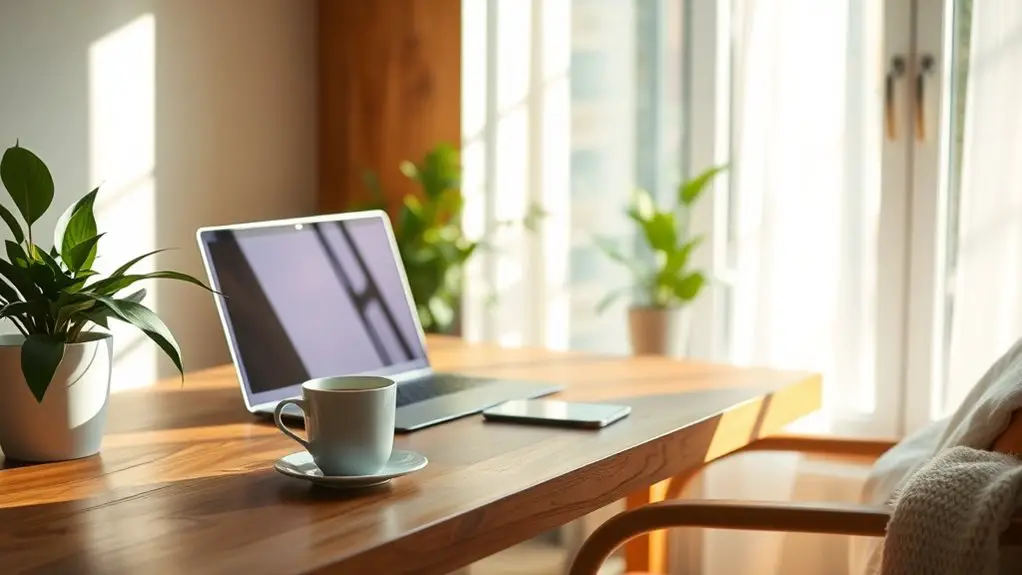To effectively disconnect from work as a remote worker, set clear work hours to define your availability and stay focused. Create a dedicated workspace that signals it’s time to be productive. Establish a post-work routine to shift your focus and limit technology use after hours to unwind. Prioritize breaks throughout the day to sustain your energy. Engage in non-work activities to enrich your life outside of work. For more insights on achieving balance, stay tuned.
Table of Contents
Key Takeaways
- Set clear work hours to establish boundaries, making it easier to disconnect after the workday ends.
- Create a dedicated workspace to mentally signal when it’s time to be productive versus when to relax.
- Establish a post-work routine that includes physical activity or mindfulness to help shift focus away from work.
- Limit technology use after hours by turning off notifications and engaging in relaxing activities to recharge.
- Prioritize breaks throughout the day to sustain focus and reduce stress, enhancing overall productivity.
Set Clear Work Hours

When you set clear work hours, you create boundaries that help you stay focused and maintain a healthy work-life balance.
By defining your start and end times, you signal to yourself and others when you’re available. This clarity not only minimizes distractions but also allows you to fully engage in work during those hours.
You’ll find it easier to switch off once your day wraps up, reducing the temptation to check emails or tackle tasks outside of your designated time.
Plus, it encourages better time management, pushing you to prioritize and complete projects efficiently.
Create a Dedicated Workspace

A dedicated workspace can transform your productivity and enhance your focus. Designate a specific area in your home where you’ll only work. This separation helps signal to your brain that it’s time to be productive.
Keep this space organized and free of distractions. A clean, clutter-free desk can foster a better mindset. Make sure your workspace has good lighting and ergonomically friendly furniture to support long hours of work.
Personalize the area with items that inspire you, but avoid excessive decor that can divert your attention. By creating a defined space for work, you’ll find it easier to switch into work mode and, just as importantly, switch out of it when the day ends.
Establish a Post-Work Routine

To effectively disconnect from work, establishing a post-work routine can be your best ally. A consistent routine helps signal the end of your workday and allows you to shift your focus.
Here are three suggestions to contemplate:
- Physical Activity: Engage in a quick workout or a walk to clear your mind and boost your mood.
- Mindfulness Practice: Spend time meditating or journaling to reflect on your day and transition into personal time.
- Hobby Time: Dedicate time to a hobby you enjoy, whether it’s reading, cooking, or crafting, to rejuvenate your spirit.
Limit Technology Use After Hours
How can you truly unwind after a long day at work? One key is to limit technology use after hours. When you keep your devices on, it’s easy to get sucked back into emails or work-related messages.
Set a specific time to disconnect from all work-related technology. This could mean turning off notifications, putting your laptop away, or even using apps that block work-related sites after hours.
Instead, focus on activities that help you relax, like reading, exercising, or spending time with loved ones. By creating this boundary, you’ll find it easier to recharge and enjoy your personal time.
Prioritize Breaks Throughout the Day
While you might feel the pressure to power through your tasks without interruption, taking regular breaks is essential for maintaining your focus and energy throughout the day.
Taking regular breaks is crucial for sustaining focus and energy, even when you’re tempted to work non-stop.
Scheduling short breaks can greatly enhance your productivity. Here are three simple ways to prioritize breaks:
- Set a Timer: Use a timer to remind you to take a five-minute break every hour. This helps you recharge without losing momentum.
- Change Your Scenery: Step outside or move to a different room during your breaks. A change of environment can refresh your mind.
- Practice Mindfulness: Use break time to practice mindfulness or deep breathing. This can help reduce stress and improve concentration.
Engage in Non-Work Activities
To truly disconnect from work, you need to engage in non-work activities that refresh your mind and spirit.
Whether it’s exploring new hobbies, catching up with friends, or practicing mindfulness techniques, these moments can rejuvenate your energy.
Make time for what you love, and you’ll find yourself more balanced and focused when it’s time to work again.
Explore New Hobbies
Exploring new hobbies can be a rejuvenating escape from the demands of work, allowing you to recharge and discover passions outside your professional life.
Engaging in non-work activities not only enhances your creativity but also boosts your overall well-being.
Here are three hobbies you might consider diving into:
- Gardening: Connect with nature and enjoy the therapeutic benefits of nurturing plants.
- Photography: Capture the world around you, enhancing your observation skills and creativity.
- Cooking: Experiment with new recipes and flavors, turning mealtime into an exciting adventure.
Connect With Friends
Connecting with friends can be a rejuvenating way to step away from work and recharge your spirit. Make it a point to schedule regular catch-ups, whether it’s a coffee date, a virtual game night, or a simple phone call.
These moments can lift your mood and remind you of life outside your job. Engaging in fun activities with friends helps strengthen bonds and fosters a sense of community. Share laughs, exchange stories, and create new memories together.
You might even discover new interests or hobbies through these interactions. Don’t underestimate the power of friendship; it’s essential for maintaining a healthy work-life balance.
Practice Mindfulness Techniques
Taking time to connect with friends lays a great foundation for engaging in mindfulness techniques.
Practicing mindfulness helps you shift your focus away from work-related stress, allowing you to recharge. Here are three effective mindfulness techniques you can easily incorporate into your routine:
- Deep Breathing: Spend a few minutes focusing on your breath. Inhale deeply, hold for a moment, and exhale slowly. This calms your mind.
- Nature Walks: Take a stroll outside and immerse yourself in nature. Pay attention to the sights, sounds, and smells around you.
- Gratitude Journaling: Each day, jot down three things you’re grateful for. This shifts your perspective and boosts your mood.
Frequently Asked Questions
How Can I Effectively Communicate My Boundaries to Colleagues?
To effectively communicate your boundaries, clearly express your availability during conversations. Use direct language and set expectations. Be consistent, and don’t hesitate to remind colleagues when they cross those lines. Respect fosters mutual understanding.
What Tools Help Manage Remote Work-Life Balance?
To manage your remote work-life balance, try using tools like Trello for task organization, Slack for communication, and time-tracking apps like Toggl. These can help you stay focused and prioritize your personal time effectively.
How Do I Handle Work-Related Interruptions at Home?
When work-related interruptions happen at home, set clear boundaries. Communicate your schedule, use do-not-disturb signals, and designate a workspace. Staying focused will help you manage distractions and maintain productivity throughout your day.
Can I Take Naps During Work Hours?
Absolutely, you can take naps during work hours if your schedule allows it. Short naps can boost your focus and productivity, just make sure to keep them brief to avoid feeling groggy afterward.
What Are the Best Ways to Unwind After Work?
To unwind after work, you can enjoy a relaxing bath, read a good book, or take a leisurely walk. Engaging in hobbies, meditating, or spending time with loved ones also helps you recharge effectively.




